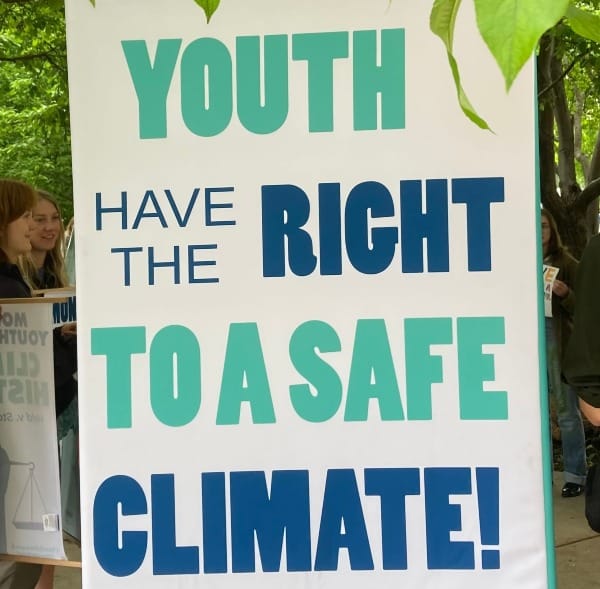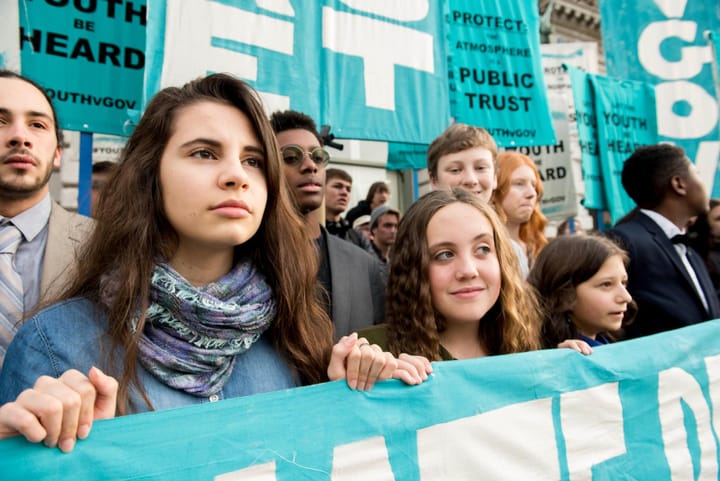New Youth Climate Case In Florida Challenges Public Service Commission’s Energy Plan Approvals

Five young people from Florida’s Miami-Dade County have filed a new climate lawsuit in state court against the Florida Public Service Commission, challenging the commission’s continual approvals of utility companies’ long-term energy plans that prioritize fossil fuels and thereby contribute to dangerous climate change. That pattern of rubber-stamping fossil fuel dependent energy plans, the plaintiffs say, locks in fossil fuel pollution that exacerbates the climate crisis and its damaging impacts, in violation of fundamental rights under the state constitution including the right to life.
Initially filed by lead plaintiff Delaney Reynolds in October, the case added several additional plaintiffs and counsel for the youth submitted an amended complaint to the court this week.
“I am honored to be part of this fight for our future along with my fellow youth plaintiffs, and I am especially grateful to those bravely joining us in the amended complaint,” Reynolds, a 25-year-old climate activist, said in a statement.
“Being born and raised in Miami, I have seen the accelerating impacts of climate change in my community first-hand. I have experienced record-breaking temperatures and lived through unprecedented hurricane and flooding events,” said plaintiff Julie Topf. “I’m proud to be part of this case to hold the Florida Public Service Commission accountable for locking our state into fossil fuel dependency and violating our constitutional rights to life.”
The Public Service Commission is responsible for overseeing statewide energy planning and regulating energy utilities, including reviewing utilities’ 10-year site plans. The lawsuit challenges the PSC’s systemic authorization of these plans that plaintiffs argue prioritize and perpetuate fossil fuel usage despite the availability of renewable energy alternatives.
“The science is clear: Florida’s current path is dangerous. We must move swiftly to renewable energy, or we risk condemning future generations to a future of climate catastrophe,” Mitchell Chester, an attorney for the plaintiffs, said in a statement.
The Florida Public Service Commission declined to comment on the pending litigation.
The lawsuit is not the first youth climate case targeting state officials in Florida. In 2018, Reynolds and other youth climate activists sued the state of Florida, including the governor and several state agencies, challenging the state’s overall fossil fuel-based energy system on constitutional grounds. The case was ultimately dismissed, and youth activists then pursued a rulemaking petition demanding the Florida Department of Agriculture and Consumer Services adopt a rule setting ambitious statewide renewable energy goals. The Department adopted this rule, but it was subsequently repealed through an act of the Republican-controlled legislature.
The new youth lawsuit, again led by Reynolds and supported by the nonprofit law firm Our Children’s Trust, is more narrowly constructed and focused on a single state agency. It follows a successful youth climate lawsuit in Hawai’i that targeted the state transportation department; that case resulted in a landmark settlement agreement in June that sets the Hawai’ian transportation sector on a pathway towards full decarbonization.
Other US youth climate lawsuits are actively pending in Virginia, Utah, Alaska, Montana, and in California against the US EPA. The case in Montana saw a trial court deliver a historic win for youth plaintiffs in 2023, and the case now awaits a decision from the Montana Supreme Court on the state’s appeal. Another landmark youth case brought against the federal government, Juliana v. United States, was ultimately dismissed earlier this year following an epic, nearly ten-year procedural battle. In a last-ditch effort to revive the case, Our Children’s Trust announced on December 9 their filing of a cert petition with the US Supreme Court, but requesting the court hold off on deciding whether to accept their petition pending the court’s decision in another case involving a prisoner on death row.


